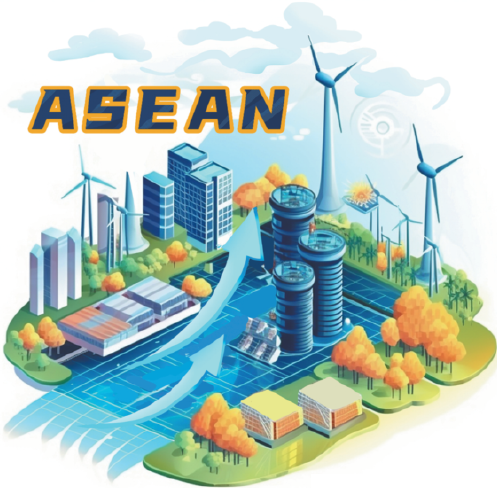Unity is key to Sino-ASEAN success


In a world marked by global interdependence, international partnerships have the capacity to influence the fate of states. China and the Association of Southeast Asian Nations are at the forefront of such collaborations, ceaselessly working to create a community with a common future.
One of the latest symbols of this is the much-anticipated start of operation of the Jakarta-Bandung High-Speed Railway, a monument to Chinese technology and standards. The flagship project of joint efforts by the two countries is set to revolutionize travel in the region. Beyond the convenience factor, this mega-infrastructure initiative is poised to generate a number of jobs directly related to the project.
Such vivid examples of the prosperous cooperation between China and ASEAN nations also include Mekong River Basin cooperative mechanisms and the China-Laos Railway, which has been widely hailed since it began operating in December 2021 and serves as a beacon of connectivity and progress.
Since China and ASEAN initiated dialogue relations in 1991, the partnership has thrived, underpinned by a commitment to political mutual trust and regional stability. A significant milestone was China's accession to the Treaty of Amity and Cooperation in Southeast Asia in 2003, marking a new era in China-ASEAN relations. Furthermore, the decision to elevate the partnership to a comprehensive strategic one in 2021 underscores their commitment to each other.
Premier Li Qiang's recent visit to Indonesia and his participation in the 26th China-ASEAN Summit, the 26th ASEAN Plus Three Summit, and the 18th East Asia Summit are testament to the unwavering dedication to deepening the ties. In the face of a complex and uncertain international and regional situation, these summits carry the potential to promote unity, deepen cooperation and inject much-needed stability and positivity into the region.
One of the most tangible fruits of China-ASEAN cooperation is the burgeoning of trade and investment relations against all odds in the current global environment.
According to data from China's Ministry of Commerce, the trade volume between China and ASEAN reached a staggering $975.3 billion in 2022, representing an 11.2 percent year-on-year increase and a remarkable 120 percent surge since 2013. By the end of July, cumulative two-way investment had surpassed $380 billion, with China establishing over 6,500 enterprises with direct investment in ASEAN.
Notably, thanks to mutual tariff cuts and smoother connection in the past decade, ASEAN emerged as China's top trading partner in 2020, surpassing both the European Union and the United States. This economic synergy has fostered a climate of mutual benefit, propelling the growth and prosperity of the entire region. Infrastructure development has also emerged as a focal point of collaboration between China and ASEAN.
These efforts span all sectors of continuing and new cooperation, with a particular emphasis on digital transformation, the green economy, public health, agriculture, disaster management, financial development, marine cooperation and cybersecurity.
Furthermore, ongoing negotiations for the Version 3.0 China-ASEAN Free Trade Area signify a commitment to promoting a higher level of openness. As seen during the third round of negotiations in Kunming, the focus is on enhancing cooperation in the digital and green economy, along with strengthening supply and industrial chains. These efforts aim to usher in a new era of economic collaboration, solidifying the foundation of the ASEAN-China partnership.
Looking ahead, experts predict a doubling or even tripling of ASEAN-China bilateral trade over the next 20 years, alongside a commensurate increase in investments. As Indonesian Ambassador to China Djauhari Oratmangun aptly put it, this foretells an exciting future for regional cooperation.
However, it is essential to recognize that challenges persist. Unilateralist and protectionist policies pursued by some countries outside the region and their provocative military exercises in and around the South China Sea have cast a shadow on Asia-Pacific cooperation, including that between China and ASEAN. In this complex landscape, unity is the key to success.
To ensure peace and stability in the Asia-Pacific region, all parties must unite to overcome these challenges, minimize disputes and nurture ASEAN-China cooperation as an evergreen tree. Only through sustained collaboration can the region hope to thrive in an era marked by weakening global demand, rising inflation and international geopolitical conflicts.
In this context, Vice-Minister of Commerce Li Fei has articulated China's commitment to expanding mutually beneficial cooperation with ASEAN. Their shared goal is to upgrade economic and trade cooperation and to build a closer China-ASEAN community of a shared future.
The partnership between China and ASEAN is a shining example of the potential for international collaboration in a rapidly evolving world. As the Jakarta-Bandung High-Speed Railway stands ready to transform Indonesia's transportation landscape, it symbolizes the progress made through China-ASEAN cooperation.
The future holds immense promise, but it also demands continued dedication to unity, stability and shared prosperity. For China and ASEAN to build a closer community with a shared future, the answer lies in their unwavering commitment to working together, overcoming challenges and forging a brighter tomorrow for all.
The author is editor-in-chief of the Observer Diplomat magazine in Pakistan.

































